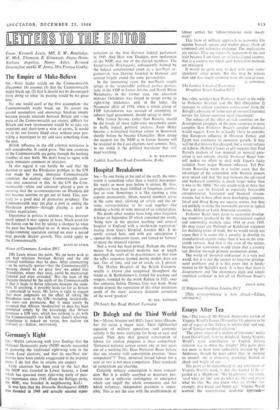Germany's Right SIR,—Whilst concurring with your findings that the National
Democratic party (NDP) merely succeeded in garnering the traditional right-wing vote in the recent Land elections, and that its neo-Nazi ten- dencies have been unduly exaggerated in the popular press, I do feel that its origins are suspect.
Little attention has been paid to the fact that the NDP was founded in Lower Saxony, a Land which has spawned every right-wing party of pass- ing importance since 1945. (Even the Refugee party, the BHE, was founded in neighbouring Kiel.) It was here that the Deutsche Reichspartei (PRP) was founded in 1948 and actually secured repre-
sentation to the first German federal parliament in 1949. And Herr von Thadden, now spokesman of the NDP, was one of the elected members. The Sozialistische Reichspartei, subsequently banned by the federal constitutional court as a neo-Nazi or- ganisation, was likewise founded in Hanover and centred largely round the same personalities.
In the intervening years the neo-Nazis sought refuge in the 'respectable' political parties, particu- larly in the FDP in Lower Saxony and North Rhine Westphalia; in the former case, one education minister (Schliitter) was forced to resign owing to right-wing tendencies, and, in the latter, the Naumann affair of 1954, when a whole group of FDP functionaries was accused of attempting to subvert legal government, should spring to mind.
Why Lower Saxony, rather than Bavaria, should be the locale of these right-wing movements seems to baffle logical political analysis. Even Hitler became a naturalised German citizen in Brunswick shortly before he became Chancellor. How strong the support for the NDP is in Lower Saxony will be revealed in the Land elections next summer. This, to my mind, is the political barometer that will need watching.






























 Previous page
Previous page